How to motivate yourself to face your social fears
Plus three things to say to yourself in the moment
🎧 Grab your headphones and check out two fantastic podcasts I was honored to be a part of! Catch our conversations here:
🎙️ Money Isn’t Scary: Host Meghan Dwyer helps us take an honest, healthy, and de- stigmatizing look at the thoughts and emotions behind our relationship with money.
🎙️ ReidConnect-ED: Co-hosts and siblings Gerald Reid, PhD and Alexis Reid, MA deep dive into mental health, learning, performance, education, wellness, executive function, and so much more. Fun fact: Jerry trained at the clinic I work at!
Hello everyone!
A dear reader and clinical psychologist who is building her own Substack (whoo-hoo!), Dr. Jackie Henry, wrote in and asked a series of three great questions about building social confidence through small, intentional risks.
Therefore, this week, we’ll cover:
How to motivate ourselves to face our social fears,
Specific language you can use when you’re in the moment, and
How I apply these in my own life.
But first, let’s orient ourselves with a 10,000-foot view.
The #1-A, gold standard, best-est way to deal with social anxiety is, in the words of the father of American social anxiety research, Dr. Richard Heimberg: “Go forth and do.” Do the very things that make you anxious. Be proud. Repeat.
A good anxiety therapist will help you do this with custom-built exercises called exposures. Even though that sounds like photography jargon or a crime of indecency, “exposure” is just the technical way of saying “face your fears.” Dr. Henry is spot on when she says exposure builds our confidence “just like we build endurance or muscle through consistent practice.”
But you don’t have to have a therapist to do exposures. You can do them independently or with a buddy, and you can work your way through a list or do them on the fly. Here’s how to get motivated:
Q: How can we motivate ourselves to face our social fears?
Or, in Dr. Henry’s words, “when someone is feeling stuck or hesitant, how can we help …shift the focus from “what might go wrong” to “what kind of life do I want to build”?”
A: Practice the things you want to do.
Pop psychology embraces the lore of “getting comfortable with being uncomfortable,” or “sitting with discomfort.” But think about WHY you’re making yourself uncomfortable. Be uncomfortable for a reason. What goals or values are driving you?
For example, a client who has been working hard to learn Spanish asked a Spanish-speaking acquaintance to have coffee. To my client’s surprise, the acquaintance had a great time and asked to do it again. My client’s “why”: “Practice Spanish and connect with a possible friend.”
Another client who is trying to be more flexible and easygoing challenged herself to join friends for a spontaneous dinner without taking the time to “get ready” with special hair and makeup. Her “why”: “Show myself I’m the kind of person who prioritizes friends over flatironing.”
Yet another client pushed himself to make small talk with colleagues in the break room rather than reading a book per usual. His “why:” “Have the option to talk.” (Spoiler: there were a couple awkward moments, but it was less awkward than ignoring his colleagues in favor of JRR Tolkein.)
All in all, put your energy into living the life you want to live. Don’t bother trying to expose yourself to something you hate. If you’ve always wanted to sing karaoke, take the steps to get onstage! But if you’ve never dreamed of belting out a Celine Dion chorus, it’s 100% ok to stay in the audience. And never try to desensitize yourself to a toxic work environment, abusive relationship, or unsafe situation.
Q: Have you found any particular practices, reflections, or language that help people take those first brave steps?
A: Yes! Here are my top three:
“This is an experiment.”
Social anxiety exposures aren’t exams. They’re experiments. You’re trying out something new. You will likely learn that:
Your feared outcome doesn’t happen,
It wasn’t as bad as you anticipated,
It was hard, but you could cope, or
You’d prefer to try again at a smaller scale or with a different approach.
All of these outcomes are a success.
“I’m in the driver’s seat.”
You’re always in charge. In my clinical practice, I encourage clients to start small—take a couple of risks in the category of, “I’m a little anxious, but I’m pretty sure I can do it.”
Then, once you have a few small risks under your belt, mix it up. Go medium or big. Skip around in your exposure wish list, or add more on the fly. Give yourself some grace when you’re feeling low, and push yourself when you feel a surge of inspiration. Again, you’re in control.
“I can step in and out of this exposure.”
You don’t have to grit your teeth through, say, an entire wedding reception. Go hide in the bathroom for a few minutes after cake cutting and breathe, but then rejoin the party. Likewise, let yourself skip happy hour during the conference, but go back for the team dinner.
Some orthodox CBT therapists consider this avoidance, but as long as you step back in after stepping out, moving in and out grants you control, choice, and a chance to regroup so you can sustain your energy and maximize your learning.
Q: How has this played out in your own life?
Any moments where you took a social risk or moved toward discomfort in service of more living, more connection, more alignment with who you are or want to be?
A: Moi? Yes indeed.
I do a lot of my own social anxiety exposures, usually in service of building community (hey, that sounds like living one’s values!).
For example, in the last few months, I invited a new neighbor over for lunch (eek!), gave a presentation for my son’s high school council (ack!), and hosted a book launch party (double ack!)
These were all challenging to varying degrees, but they were also standalone events. Apropos to the spirit of facing our fears again and again, here’s a challenge I’ve been facing for a couple of months: I joined a new gym.
I find my new gym intimidating—the aesthetic is best described as “prison yard,” and there’s a lot of equipment I’ve never used before (“landmine attachment”—seriously?). For me, feeling intimidated causes social anxiety to come surging back. It’s more than I bargained for—I have to not injure myself and make new friends?
Therefore, in the service of feeling more connected and more comfortable, I’m trying to talk to one new person each time I go. Sometimes it falls flat: one guy just said “A year” and turned back to tying his shoes when I asked him how long he’d been a member. But usually it goes well: I’ve learned six or seven new names, had conversations about outdoor swimming (which I don’t do) and eating Oaxacan food in Los Angeles (which I definitely do), and even got coffee with a fellow mental health practitioner.
All in all, we each have our own fears, which means we’re all in this ‘humanity” thing together.
But if we decide we’d rather lighten our load, we can face our fears at our own pace to learn that we are capable. Whether it’s conversing in a new language, initiating small talk in the break room, or asking a stranger how the landmine thingy works, when we face our fears, we are truly, in that moment, living our values and being the person we want to be.
My quest for reviews continues! If How to Be Enough made you laugh, think, reflect (or procrastinate on something else), an *honest* review on Amazon will spark the same for someone else.
1️⃣ Go to the book’s Amazon page,
2️⃣ Click the blue text that says “[#] ratings” next to the stars
3️⃣ Click the “Write a customer review” button. It can be short: “Helpful!” “Loved it!” Or just stars!
4️⃣ Bask in my gratitude! 🙏😊🌟 Thank you for aiding in my quest!
Be kind to others and yourself!
If you received this from a friend, sign up for more (hey, there’s a button right there) or at ellenhendriksen.com.







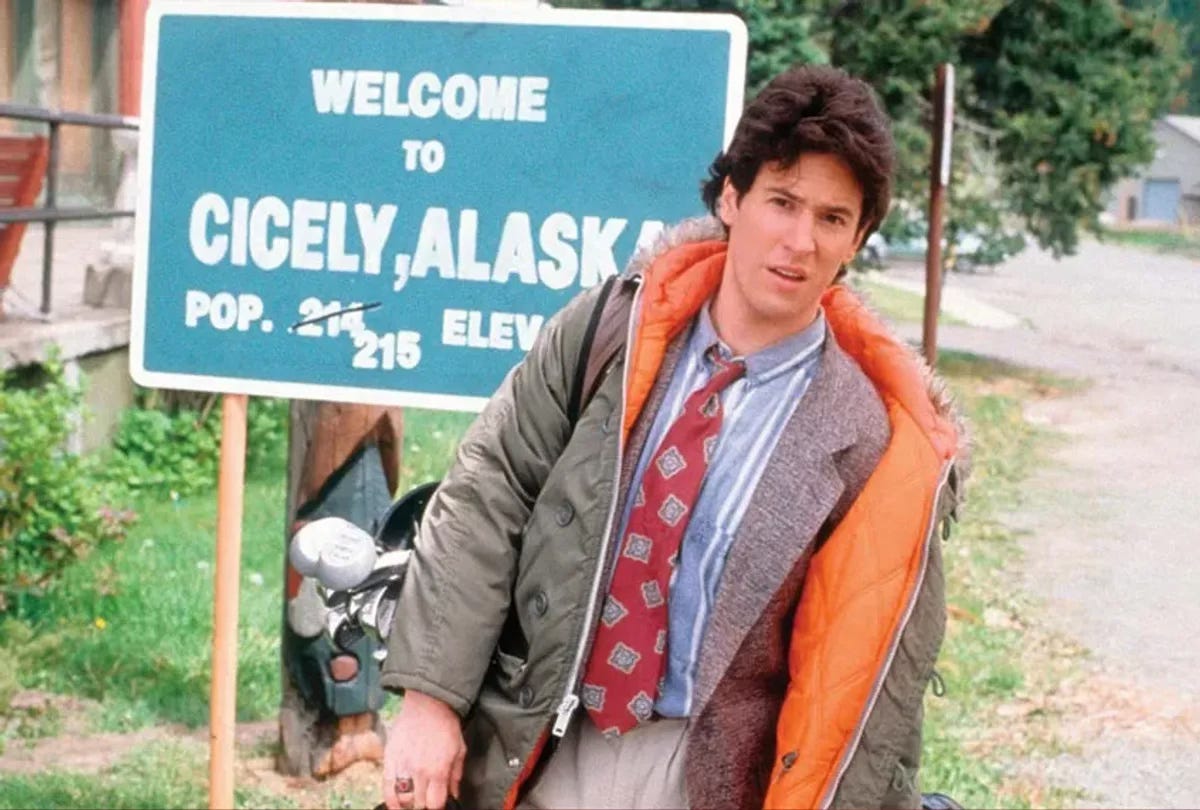
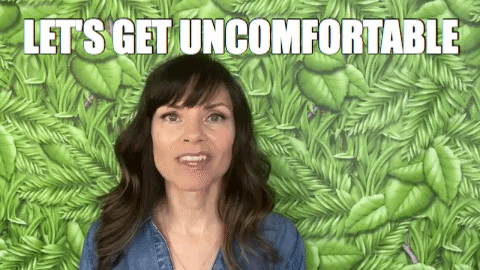
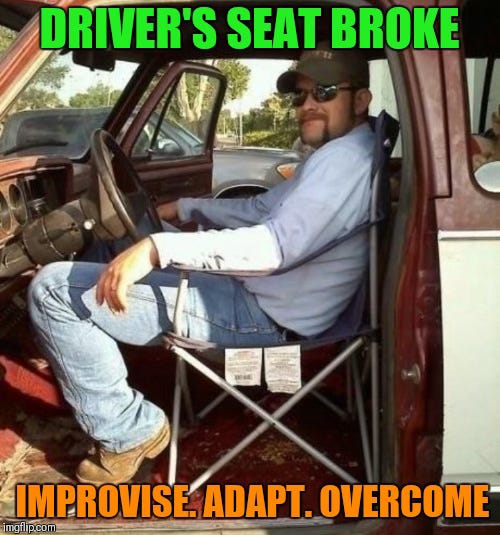
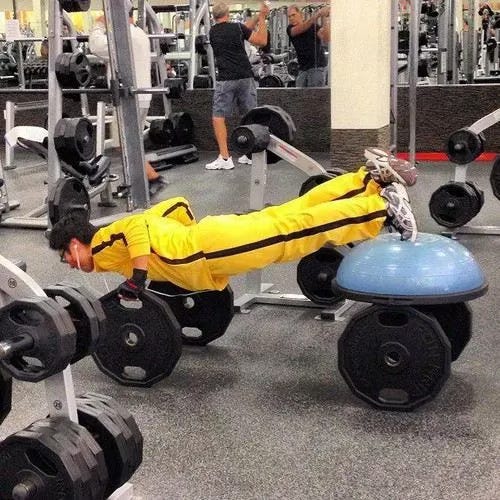
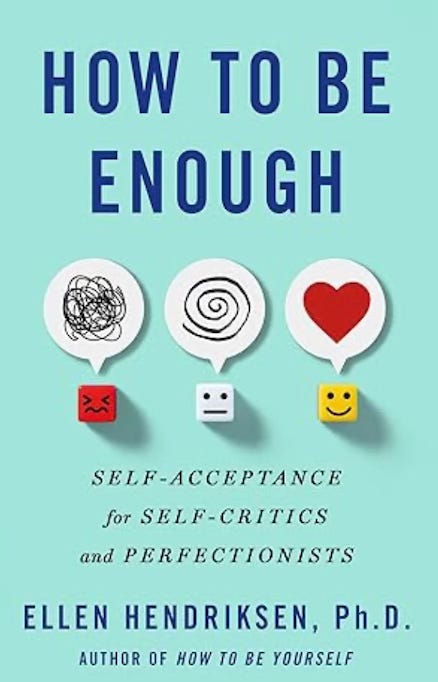


Great post! Right up my alley! I’ve been camera-shy and worked on making short Substack note videos to rehab myself. I’m still very uncomfortable but also having fun with it! 😅
Thank you! I took a long lingering look at the gym photo. What in the world??? You are incredibly brave to step into that arena, fearless exposure! Curious about the equipment you were skillfully managing. Well being exercise of body, mind and heart. Always appreciate your thoughts and insights.